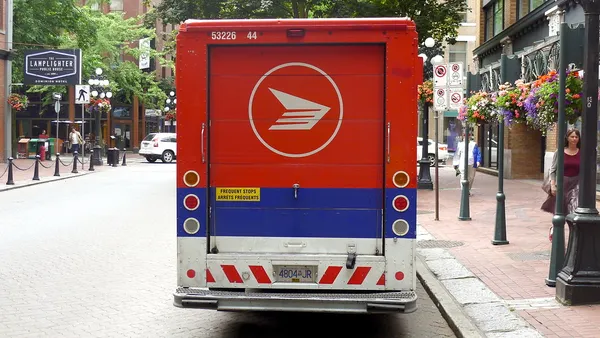Dive Brief:
- Amazon stoked yet more speculation that it intends to compete with 3PLs like UPS and FedEx when it included "companies that provide fulfillment and logistics services for themselves or for third parties, whether online or offline" in an annual SEC filing that requires companies to describe their competition, spotted by Fortune.
- Amazon's list of competitive sectors was naturally quite long and varied, but including 3PLs runs counter to the descriptions of Amazon's logistics business on the company's recent fourth quarter earnings call, when executives described Amazon Logistics as extra capacity to dial up when needed.
- "We have great partners in place for our business and support globally, what we do is add capacity where we feel we need to speed up service or ensure demand, particularly at peak," said Amazon Director of Investor Relations David Fildes on the call.
Dive Insight:
Amazon has a tightrope walk to perform when it comes to logistics. The company receives favorable rates and special service from carriers like UPS and USPS that help it deliver shorter ship times and free shipping, but its growing internal freight and logistics capacity, encompassing air cargo, trucking, ocean shipping and last-mile service to varying degrees, may eventually change the dynamics in those relationships.
In December, FedEx CEO Fred Smith dismissed the idea that Amazon is a competitor on an earnings call: "We look at Amazon as a wonderful company in service and they're a good customer of ours. We don't see them as a peer competitor at this point in time for many reasons," he said.
And Amazon holds that its growing network of logistics resources is intended to add speed and capacity when and where needed, not to transition away from other carriers.
"We know where we're moving things between warehouses and sort centers and by not involving third parties all the time, we can find that we can extend our ... order cutoffs and we've done that over the last few years. So that's also another helpful side benefit for consumers when we are doing our own logistics, excuse me, transportation final delivery," said CFO Brian Olsavsky.
But Morgan Stanley isn't buying it. In a recent research note, analysts wrote: "The scale of the operation so far (en route to 100 planes, 20,000 vans, several thousand truck trailers and ramping ocean moves) does not imply a 'peak season only' or 'overflow volume only' operation to us. With AMZN’s Logistics cost continuing to grow (~$6.7 bn spent in 4Q alone), we believe its internal logistics network can be a key source of cost savings and improved customer service."
It's a convincing argument in light of this comment from Olsavsky on the same call: "What we like about our ability to participate in transportation is that a lot of times, we can do it at the same cost or better and we like the cost profile of the two."














